On September 10, 1965, the day after Hurricane Betsy plowed through southeastern Louisiana, President
Lyndon Johnson flew to New Orleans. He went to the people, to shelters where evacuees were gathered, to
neighborhoods all over the city. There was no electricity and, so that people could see and hear him at one
shelter, he took a flashlight, shined it into his face and said into a megaphone, "My name is Lyndon Baines
Johnson. I am your president. I am here to make sure you have the help you need."
And that's exactly what he did. He cut through bureaucratic red tape and, before he'd even left the city
that day, he saw to it that the wheels were set in motion for the city's recovery.
Those who remember Betsy will always be grateful to President Johnson for his decisive leadership, his
critically needed comfort and his determination to bring timely help to the area, and to immediately start
rescuing, recovering and rebuilding.
He saw what needed to be done and, without hesitation, put the entire weight of the federal government
behind the effort to bring aid to the people and to supply whatever was necessary to begin the clean-up and
rebuilding process. In fact, it was Pres. Johnson who soon afterward initiated plans for a long-needed levee
system to protect the city. He stood behind his commitment to the area.
Too late, we would find that some in the U. S. Army Corps of Engineers did not. We now know that the city
could have been spared much of the devastation of August, 2005, had the Corps' design and construction of
critical floodwalls not been seriously flawed. Nancy
Lyndon Johnson flew to New Orleans. He went to the people, to shelters where evacuees were gathered, to
neighborhoods all over the city. There was no electricity and, so that people could see and hear him at one
shelter, he took a flashlight, shined it into his face and said into a megaphone, "My name is Lyndon Baines
Johnson. I am your president. I am here to make sure you have the help you need."
And that's exactly what he did. He cut through bureaucratic red tape and, before he'd even left the city
that day, he saw to it that the wheels were set in motion for the city's recovery.
Those who remember Betsy will always be grateful to President Johnson for his decisive leadership, his
critically needed comfort and his determination to bring timely help to the area, and to immediately start
rescuing, recovering and rebuilding.
He saw what needed to be done and, without hesitation, put the entire weight of the federal government
behind the effort to bring aid to the people and to supply whatever was necessary to begin the clean-up and
rebuilding process. In fact, it was Pres. Johnson who soon afterward initiated plans for a long-needed levee
system to protect the city. He stood behind his commitment to the area.
Too late, we would find that some in the U. S. Army Corps of Engineers did not. We now know that the city
could have been spared much of the devastation of August, 2005, had the Corps' design and construction of
critical floodwalls not been seriously flawed. Nancy
Excerpts from "LBJ Remarks in New Orleans, September 10, 1965"
I'm here this evening to pledge to you the full resources of the federal government to
Louisiana to help repair as best we can the injury that has been done. Throughout the day I
have talked to Senator Long and Senator Ellender, Congressmen Boggs and Willis...about
what has taken place in this great state. As we flew to New Orleans we discussed the ways
and means of putting the compassion of the United States in specific and helpful action.
With me are Governor Buford Ellington, in charge of the federal government's Office of
Emergency Planning, and whose responsibility it is to make sure that all that needs to be
done gets done and as quickly as possible; also, with me are Secretary of Agriculture
Orville Freeman, General Collins, Chairman of the American Red Cross, Dr. Luther Terry,
the Surgeon General of the United States, Mr. Gene Foley, the head of our Small Business
Administration, and we'll have further announcements as we go along. I am ordering in
teams from the Office of Emergency Planning and the Army Corps of Engineers
immediately. The Small Business Administration will be prepared to make long-term loans
to rehabilitate both businesses and home.
I am here because I want to see with my own eyes what the unhappy alliance of wind and
water have done to this land and to its good people. And when I leave today you can be
sure that the federal government's total resources will be turned toward helping this state
and its citizens find its way back from this tragedy.
I am determined that we can help these people in every way that human compassion and
effective aid can serve them. I have ordered that all red tape be cut. Our assistance will
be given the highest priority. The Department of Agriculture is already providing
emergency food; troops from Fort Polk have been called into action to prevent starvation
and to protect life and property; the Small Business Administration will tomorrow morning
begin processing the first long-term loans in New Orleans.; the Corps of Engineers is at
work tonight, opening levees and dikes and removing debris. But we're ready to do much
more.
Tonight I will order the following: We will allocate the funds necessary to rebuild the
streets, highways and bridges. We will repair essential facilities, such as public buildings,
docks, hospitals and schools. We will distribute through the Red Cross the medicine and
the food necessary to carry the victims through the emergency period. We will provide
temporary housing and emergency shelter. We will supply federal equipment for
construction, repair and clearing. We will assist veterans to retain their homes by a
temporary suspension of V.A. mortgage payments.
This nation grieves for its neighbors in Louisiana, but this state will build its way out of its
sorrow. And the national government will be at Louisiana's side to help it every step of the
way, in every way that we can.
I'm here this evening to pledge to you the full resources of the federal government to
Louisiana to help repair as best we can the injury that has been done. Throughout the day I
have talked to Senator Long and Senator Ellender, Congressmen Boggs and Willis...about
what has taken place in this great state. As we flew to New Orleans we discussed the ways
and means of putting the compassion of the United States in specific and helpful action.
With me are Governor Buford Ellington, in charge of the federal government's Office of
Emergency Planning, and whose responsibility it is to make sure that all that needs to be
done gets done and as quickly as possible; also, with me are Secretary of Agriculture
Orville Freeman, General Collins, Chairman of the American Red Cross, Dr. Luther Terry,
the Surgeon General of the United States, Mr. Gene Foley, the head of our Small Business
Administration, and we'll have further announcements as we go along. I am ordering in
teams from the Office of Emergency Planning and the Army Corps of Engineers
immediately. The Small Business Administration will be prepared to make long-term loans
to rehabilitate both businesses and home.
I am here because I want to see with my own eyes what the unhappy alliance of wind and
water have done to this land and to its good people. And when I leave today you can be
sure that the federal government's total resources will be turned toward helping this state
and its citizens find its way back from this tragedy.
I am determined that we can help these people in every way that human compassion and
effective aid can serve them. I have ordered that all red tape be cut. Our assistance will
be given the highest priority. The Department of Agriculture is already providing
emergency food; troops from Fort Polk have been called into action to prevent starvation
and to protect life and property; the Small Business Administration will tomorrow morning
begin processing the first long-term loans in New Orleans.; the Corps of Engineers is at
work tonight, opening levees and dikes and removing debris. But we're ready to do much
more.
Tonight I will order the following: We will allocate the funds necessary to rebuild the
streets, highways and bridges. We will repair essential facilities, such as public buildings,
docks, hospitals and schools. We will distribute through the Red Cross the medicine and
the food necessary to carry the victims through the emergency period. We will provide
temporary housing and emergency shelter. We will supply federal equipment for
construction, repair and clearing. We will assist veterans to retain their homes by a
temporary suspension of V.A. mortgage payments.
This nation grieves for its neighbors in Louisiana, but this state will build its way out of its
sorrow. And the national government will be at Louisiana's side to help it every step of the
way, in every way that we can.
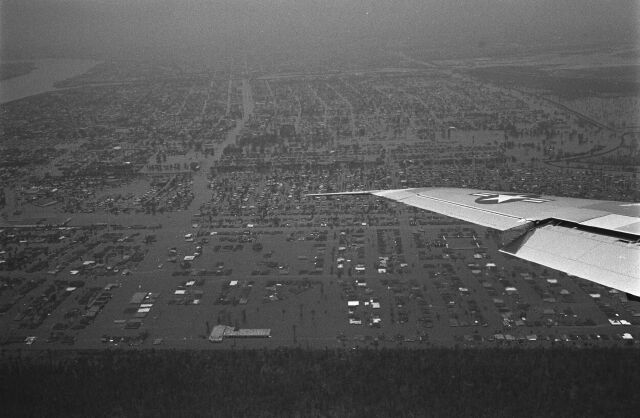
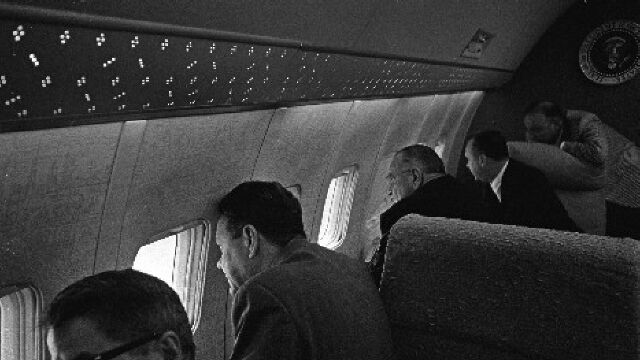
| Hurricane Betsy, 1965 |
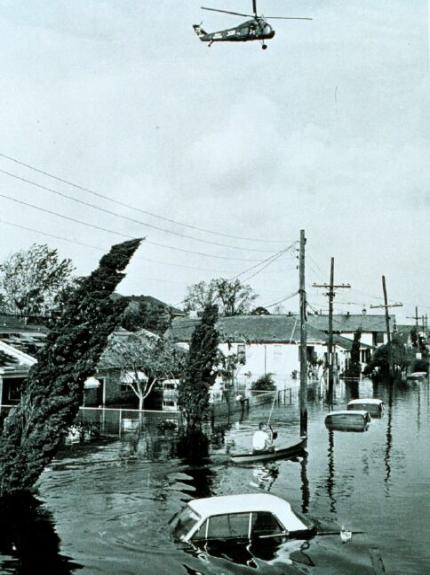
| Rescue helicopters fly over New Orleans, September 9, 1965. After the levee system was constructed, people in the city hoped, and were given reason to believe, that this scene would not be repeated. |
| Senator Russell Long, President Lyndon Johnson and others view the flooded city of New Orleans before landing at the airport to tour the city, reassure the people and announce plans for south Louisiana's recovery. |
Editorial from The Louisiana Weekly - September, 1965
Still dazed and horrified by the disaster and tragedy wrought by Hurricane Betsy in this
community, residents in and near New Orleans are now going about the grim task of locating
and burying their dead, and are also busily engaged in a massive humanitarian effort of
caring for the sick, the naked, the hungry and the homeless.
The Louisiana Weekly is aware that mere words of consolation and sympathy are trite at this
time regardless of how sincere the intentions might be. Experience has taught us that we
cannot live in the past or in the future--but only in the present. What has happened during
the past few days cannot be undone, and so it is left to those who were fortunate enough to
survive the killer hurricane to exert every effort in ministering to the needs of those who
lost everything.
In this regard, The Louisiana Weekly pledges its services to the public for securing and
disseminating information on emergency aid, food, clothing, shelter, etc.
We realize it is indeed impossible to single out any individual or organization for
commendation since so many persons of both races forgot all previous differences and
worked shoulder-to-shoulder in the grim emergency. There are many Negroes who were
rescued from the flood-stricken area who now owe their lives to the prompt action of their
white neighbors, and vice versa.
Then, too, it must be remembered how the nation's Chief Executive, President Lyndon
Baines Johnson, rushed to this area and assured immediate financial assistance. Nor can it
be forgotten that our state and local officials displayed superhuman endurance by keeping
themselves available around-the-clock for many days.
All-in-all, Hurricane Betsy--devastating and terrible--created an emergency which has
welded all Orleanians together, regardless of race or color, in a spirit of neighborliness.
Through its tragedy, this disaster has brought to us the full realization that we are indeed
our brother's keeper.
We are our brother's keeper.
A highly regarded newspaper, The Louisiana Weekly was established in 1925. To visit their
website, click here.
Still dazed and horrified by the disaster and tragedy wrought by Hurricane Betsy in this
community, residents in and near New Orleans are now going about the grim task of locating
and burying their dead, and are also busily engaged in a massive humanitarian effort of
caring for the sick, the naked, the hungry and the homeless.
The Louisiana Weekly is aware that mere words of consolation and sympathy are trite at this
time regardless of how sincere the intentions might be. Experience has taught us that we
cannot live in the past or in the future--but only in the present. What has happened during
the past few days cannot be undone, and so it is left to those who were fortunate enough to
survive the killer hurricane to exert every effort in ministering to the needs of those who
lost everything.
In this regard, The Louisiana Weekly pledges its services to the public for securing and
disseminating information on emergency aid, food, clothing, shelter, etc.
We realize it is indeed impossible to single out any individual or organization for
commendation since so many persons of both races forgot all previous differences and
worked shoulder-to-shoulder in the grim emergency. There are many Negroes who were
rescued from the flood-stricken area who now owe their lives to the prompt action of their
white neighbors, and vice versa.
Then, too, it must be remembered how the nation's Chief Executive, President Lyndon
Baines Johnson, rushed to this area and assured immediate financial assistance. Nor can it
be forgotten that our state and local officials displayed superhuman endurance by keeping
themselves available around-the-clock for many days.
All-in-all, Hurricane Betsy--devastating and terrible--created an emergency which has
welded all Orleanians together, regardless of race or color, in a spirit of neighborliness.
Through its tragedy, this disaster has brought to us the full realization that we are indeed
our brother's keeper.
We are our brother's keeper.
A highly regarded newspaper, The Louisiana Weekly was established in 1925. To visit their
website, click here.
| President Lyndon Johnson's remarks to the people of Metro New Orleans the day after Hurricane Betsy struck ~and~ An editorial from The Louisiana Weekly, September, 1965, "Our Brother's Keeper" |
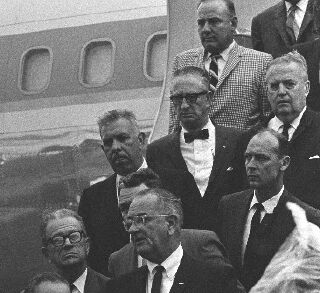
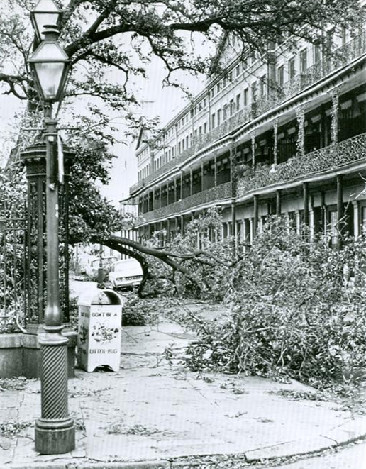
| Above, President Johnson arrives from Washington with a group of Senators and Congressmen. Right, fallen trees block the street in front of the Pontalba Apartments in the French Quarter. The caption read: "Hurricane Betsy uprooted hundreds of trees in the city; trees and other debris line the streets. This view in the historic French Quarter, next to Jackson Square, shows some of the damage." |